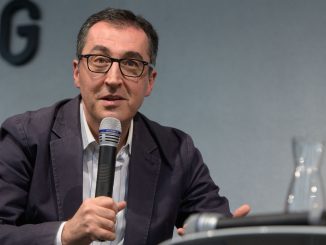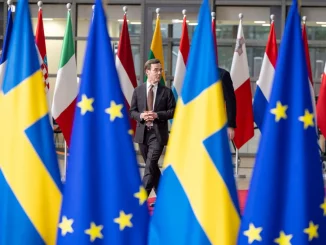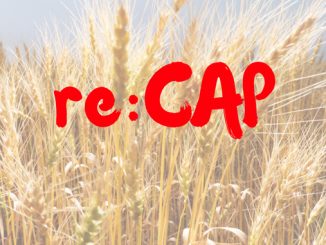By Oliver Moore
Europe’s strongest economy is seeing its farming sector decimated. At an incredibly rapid rate, both the number of farmers and the income of those left farming is nose diving.
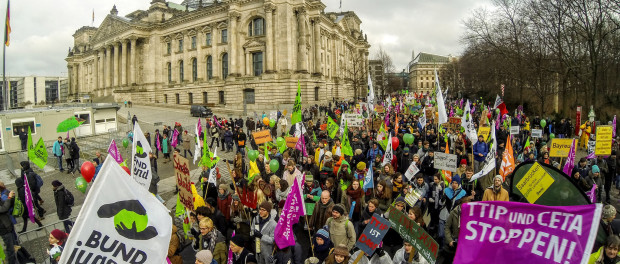
The latest statistics from the European Commission state Germany farm incomes are down almost 40% from 2014 to 2015. This is the second biggest drop in the entire EU, after Latvia. On average EU farm incomes are up 2.3%.
The situation is so bad in fact, that what used to be an environmental protest against industrial farming has become, equally, an event to highlight the precarious position of small to mid sized family farms. The annual Wir Haben Es Satt– we are fed up – protest, which brings many thousands out onto the Berlin streets in the cold of January – was this year focused on protecting family farms. Indeed the event was themed “No future without farmers”.
I met Christoph Dahlman a 42 year old cereal farmer from Westfalia in Berlin. I asked him why he and so many other farmers drove their tractors to the German capital to join with a pot pourri of protestors.
“For me it’s simple. In 1990 there were 700,000 farmers in Germany. Now, there are 280,000. That’s a disaster”.
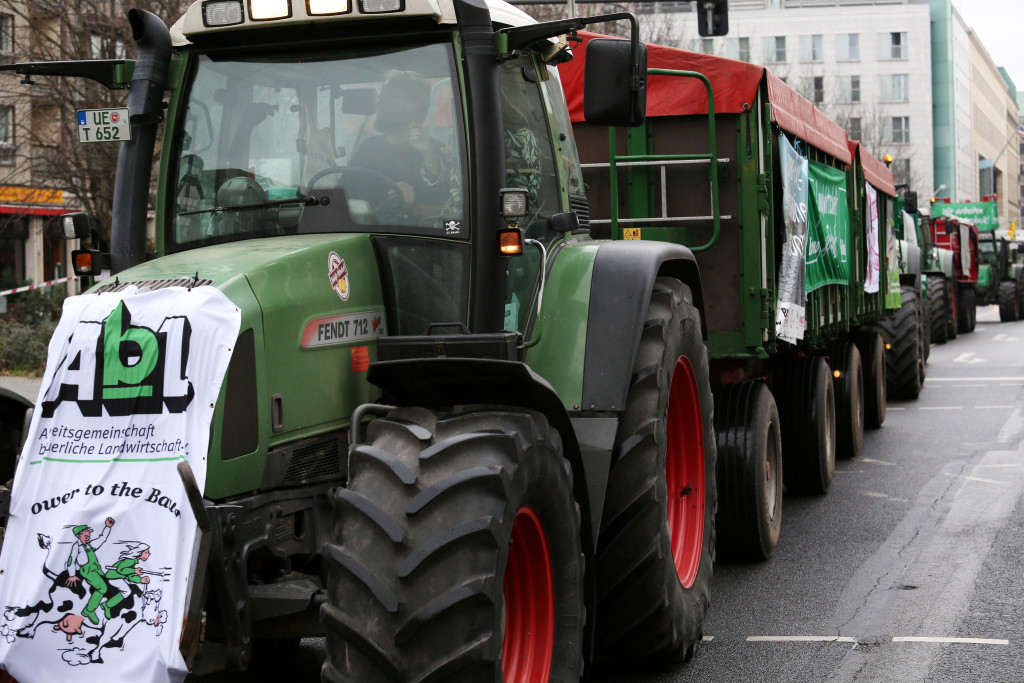
Ottmar Ilchmann is a dairy farmer in the east-Friesland region of Germany. He is also vice-president of German small farmer organisation ABL (Arbeitsgemeinschaft Bäuerliche Landwirtschaft).
“In German agriculture milk and pig-farmers are the main losers at the moment. They have to struggle with a massive drop in their incomes – for these sectors, more like 70% since 2014. The German dairy and slaughter industries are focused on exports to third countries, especially in parts of Asia and Africa. In 2013 that was easy and brought high prices, so the prices for milk and pigs in Germany were higher than the EU average. The milk and pig production has increased, many new stables for cows and pigs were built in recent years. But in the middle of 2014 all that changed completely. The quantity of exported milk-powder, butter and pig-meat continued growing, but now for very low prices.”
A young couple, in their 20s – Stephan and Carla Kroner – are inheriting a farm next year. “We want a future in farming. We don’t want to live in a village with just one huge farm, we want a community of farmers to work with” they told me.
This is increasingly unlikely. Ulrich Jaspers works with ABL. “Now some experts believe that in the north of Germany up to 15 % of holdings will give up within one year” he tells me.
According to ABL, there has been a 4.2% drop in the number of dairy farms from November 2014 to November 2015, from 76469 to 73255. However, there has only been a 0.3% drop in the number of cows over the same period, from 4295680 to 4284639. A process of consolidation is undoubtedly underway.
This process is progressing at what for many is an alarming rate. Indeed farms are being bought up by investment companies, often insurance companies, which turn a dozen dairy farms into one massive maize plantation. This process is more pronounced in eastern Europe, where, in countries like Romania, there are now 30,000 acre farms owned by companies.
Before the big protest, which coincides with Green Week , Europe’s biggest agri trade show, a farmer’s breakfast is held in the iconic MarktHalle Neun – Berlin’s version of Cork’s English Market.
There, I spoke with Renate Kuenast, a German member of Parliament, and former Minister for consumer protection, food and agriculture about this topic.
“More and more international investors are buying land here- the pressure is enormous. Family farmers can’t buy or rent, it’s too expensive. The export concentration focuses on overproduction despite the lack of a market. This overproduction kills family farming. Organic farming is doing better, their market is growing. But for the others it’s very difficult.”
Samuel Feret, president of EU farm NGO Groupe de Bruges, confers. “This rapid loss of farmers means the loss of employment in many territories. The abandonment of livestock also leads to what I call a‘cerealisation’ of the land – more cash crops equals less grasslands. Cerealisation increases the rate of pesticides and mineral nitrogen in the water. It also impacts the landscape and the soil fertility. You need a minimum of semi-permanent grasslands because grasslands recycle water.”
Indeed there is strong evidence for the negative flooding impact of the conversion of dairy farms into cereal farms in the Loire valley in Feret’s native France.
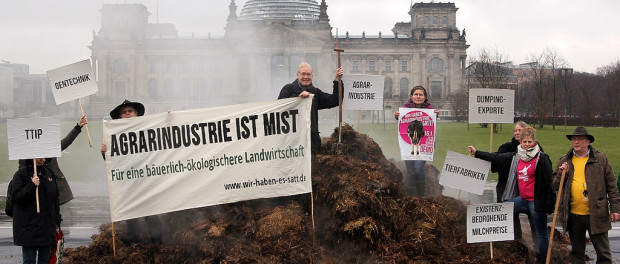
The European Milk Board is an umbrella organisation for 20 associations, representing about 100,000 dairy farmers in 15 European countries, including ABL in Germany. It has promoted what it calls a market responsibility programme. This combines monitoring and response in three phases. These are early warning (market index falls by 7.5%); crisis (market index falls by 15 %) and finally obligatory cutback phase (market index falls by 25%).
This proposed programme, in conjunction with careful monitoring, includes incentive programmes for extra consumption via increased suckling-calf production, milk fattening of heifers, bonuses for reducing production , levies for increasing production, and, if the market falls by 25% or more, universally applicable reduction in the supply of milk by 2–3% for a defined period.
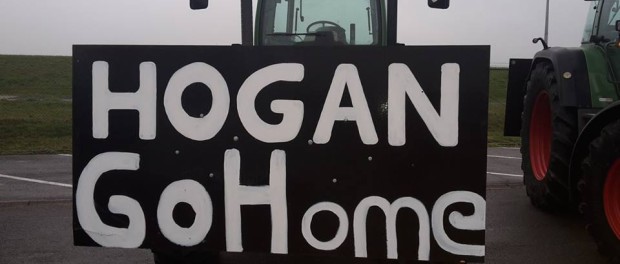
This sort of approach seems unlikely with Phil Hogan as Commissioner. Indeed the EMB question his suitability for the job: “EU Commissioner for Agriculture Phil Hogan is not prepared to engage with this concept or table his own proposals for tackling the causes of the massive price collapses. Given his head-in-the-sand attitude, is Hogan’s position as Commissioner for Agriculture still tenable?” they asked at their own Green Week event in January.
His job, they state, is to maintain standards of living and the numbers farming and yet “for months now, farm-gate milk prices in many countries have been only 25 and 30 cents per kilo, while it has been proven that production costs are higher than 40 cents. Some farms have already gone bankrupt. Others can only continue producing with the help of further loans of tens or hundreds thousands of euros.”
“This crisis is going on longer than previous ones” worries Ottmar Ilchmann. “This time, unlike the other times, the quantity of milk and pork has not decreased. We must stop with the exporting offensives and start instead with quality offensives to meet the growing demand for food produced with high standards in animal welfare and care for the environment.”
Ilchmann sees one chink of light: “At this moment we see a very interesting development involving one of the biggest dairy concerns in Europe. The Friesland-Campina dairy in the Netherlands pay a bonus to milk farmers who don’t increase production or who even reduce production. This shows that it is possible, if we want to it. It is no technical question but a political one.”
However this may simply be a short term move based on changing facilities by the Dutch company.
This may just be the start of it. In February, the biggest Swiss dairy Emmi also announced financial support for production cuts.
And very significantly, French Minister Stephane Le Foll has submitted a memorandum on market regulation tools – including production cuts – to the EU Commission. This has wider support among EU Member States too.
Many questions remain. Does the dairy sector learn – and, make any adjustments – from crisis to crisis? Will Phil Hogan back track – and what if he does? Is the process of consolidation, and all the losses to income, employment, and farmer numbers it has brought to Europe’s political and economic powerhouse – inevitable? And if not – what’s the alternative?
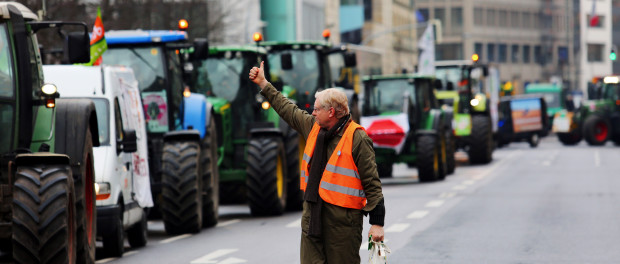
Milk price round up in selected member States (Via EMB)
Denmark: price: 29,2 c. (4,2% fat / 3,4% protein); Production increase in 2015: approx. 4%
Currently a dairy farmer in Denmark produces on average 1,7 m litre per year and looses 500€ per day.
Ireland: price: 24-26 c. Production increase in 2015: approx. 13%
Germany: prices between 24,5 c (North) and 29,5 c (Bavaria). Losses in 2015: 1000€/cow. Production increase 2015: 1,4-1,5%.
Netherlands: prices between 27,5 c and 29,25 c (incl. bonus payments, with 4,41% fat / 3,47% protein and 4,51% lactose). New bonus system at Friesland Campina: 2c/litre more for producers who do not increase their production for 6 weeks, compared to the same period the previous year. Many producers interested, but only a temporary solution for Friesland Campina until the new dairy is ready.
Belgium: 22 c Production increase in 2015: Flanders: 5%, Wallonia: 1%
This article originally appeared in the Irish Examiner newspaper’s farming supplement



